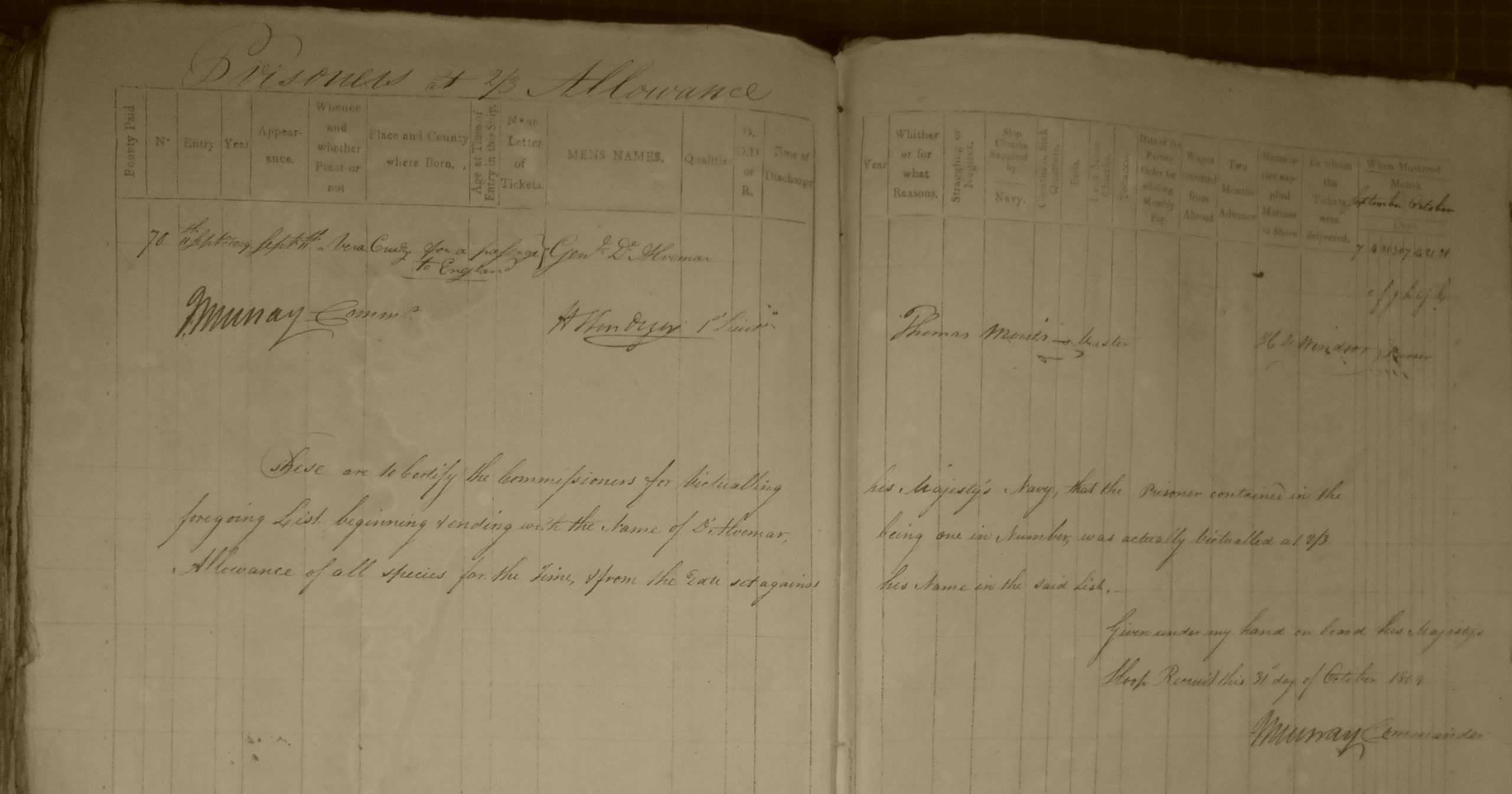
D’Alvimart – An unpleasant shipmate?
21 February 2023The St Bridget incident
13 March 2023Prima Donna – PH. 13 (O. No. 78097) 1876-1896 then Prima Donna PZ.594 from 1896- 1910
So much research, initially triggered by a simple query, is then boosted by mutual cooperation amongst fellow researchers. Such was the case with this account which was triggered by a real-photo postcard entitled ‘A CATCH OF HERRINGS AT SCARBOROUGH.’ The photo featured a Penzance lugger, alongside the wharf at Scarborough, with her deck full of fish, as the fishermen laboured to clear the catch from their nets.
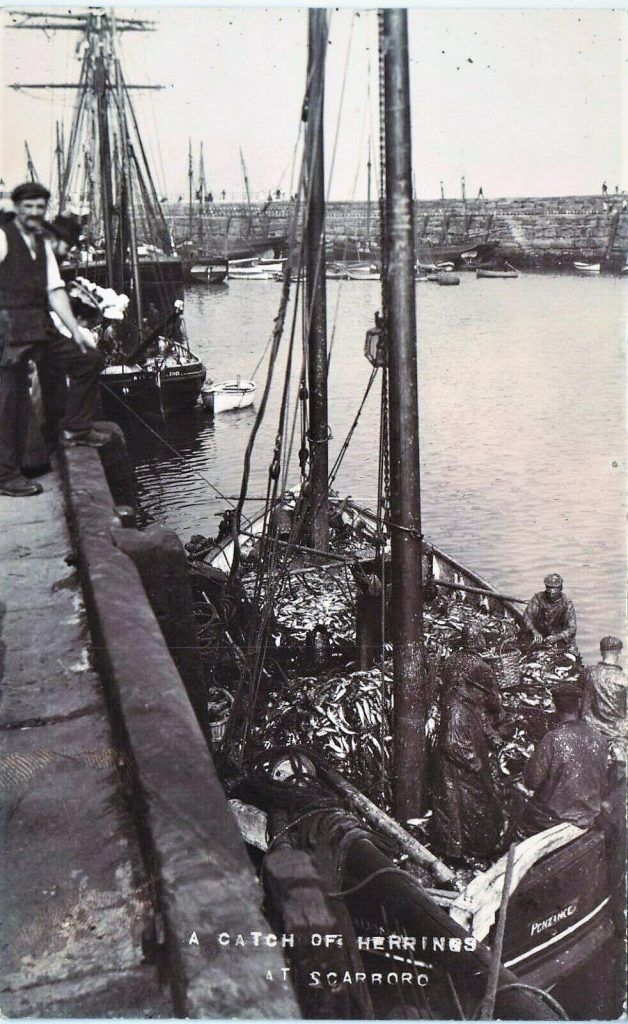
In the photo – a stern view of the lugger – only a tantalising part of her name was visible below the mizzen outrigger, by which it is partially obscured by the wharf. Just above the ‘HER…’ of the word herrings of the post card caption, the letters ‘… A DON ..’ of her name can just be made out. –

The postcard had just (Feb.2023) been purchased by my good mate John McWilliams, of St. Ives, and he buzzed me a copy, wondering which Penzance lugger I thought it might be. However, before I came to any conclusion, John came back with the tentative name PRIMA DONNA, with which I positively concurred.
Having identified the lugger concerned as the Prima Donna – PZ.594, with John’s permission I now add this information to my account of that lugger, which has been a work in progress since pre-covid. Here I must also acknowledge the great debt I, and fellow maritime history researchers, owe to my late friend Gary Hicks, of Plymouth. Despite no longer being with us, Gary’s indefatigable and painstaking in depth study of Plymouth registered mercantile and fishing craft – published in CD format in 2007 – constantly fills gaps in our knowledge, and from his source I have been able to glean key information about her Plymouth years.1
The decked lugger Prima Donna, was of the Mount’s Bay mackerel-driver type, built at Porthleven in 1879, by Thomas Sandry & Son. Perversely, it seems that she may have been launched under a different name – a most unusual occurrence.
On Wednesday, the beautifully – modelled drift-boat Lubelia, sailed for Plymouth. She had been launched from the ground of Messrs. T. Sandry and Son, who are her builders, and is the property of Capt., F. Johns, New Street, Plymouth. Her dimensions are as follows: – Keel 46 ½ ft., beam 14 ft., depth of hold 7 ft. She has been pronounced the most perfect model ever sent from the port. The excellent workmanship and quality of material employed will sustain the repute of this well-known form. This firm has also recently launched the Jonadab, keel 43 ft., beam 14 ft., depth of hold 7 ft.;2 also the Unexpected, keel 44 ft., beam 14 ft., depth of hold 7 ft.
Cornish Telegraph, Tuesday, January 28th, 1879
However, unlike the Jonadab and Unexpected, which were registered in the Port of Penzance, the Prima Donna was registered in the Port of Plymouth, in the ownership of fisherman Frederick William Johns, of that port, on February 12th, 1879. No craft named Lubelia was then registered in Plymouth, nor was any such listed in Lloyd’s Register of Shipping, 1880, nor yet in the annual Mercantile Navy List – which recorded year by year, all British vessels, and many of the larger 1st Class fishing-boats. I suspect that, assuming the launch report was not totally inaccurate, the first name of this vessel would have been Lobelia, rather than Lubelia – plant names being very popular down through the ages. Whatever, this digression is probably just another red-herring, as only one Lobelia features in the Mercantile Navy List for 1880 – and she was a smack of 44 tons, built in Ardrossan in 1876, and registered there.
The Prima Donna, however, does feature there in 1880, along with others of that name:

And, not to be confused with the Penzance schooner of that name which was tragically lost with all hands, off Land’s End in the great blizzard of March 9th-10th, 1891.
Whether the different name was a mistake by the reporter, or a change of mind by the owner, may never be resolved, but I am happy to assert that they were one and the same vessel – and the Prima Donna continued to be listed annually, in Fredk. W. Johns name, in the Mercantile Navy Lists, from 1880 to 1896.
The Prima Donna, which for the first phase of her working life served as a herring-driver, was registered at Plymouth, both as a British vessel, when she was given the Official Number 78097, and her registered dimensions were recorded as – Length, 50.8 ft.; Breadth, 14.3 ft.; Depth of Hold, 6.6 ft.; giving her a registered tonnage of 18.54 tons; and as a British Sea-Fishing boat – though the Fishing Boat registers for Plymouth have not survived the ravages of time.
The Appropriation Book recording the issue of her Official Number at Plymouth, confirms her registration at Plymouth, under No. 3/1879, on 12th Feb.
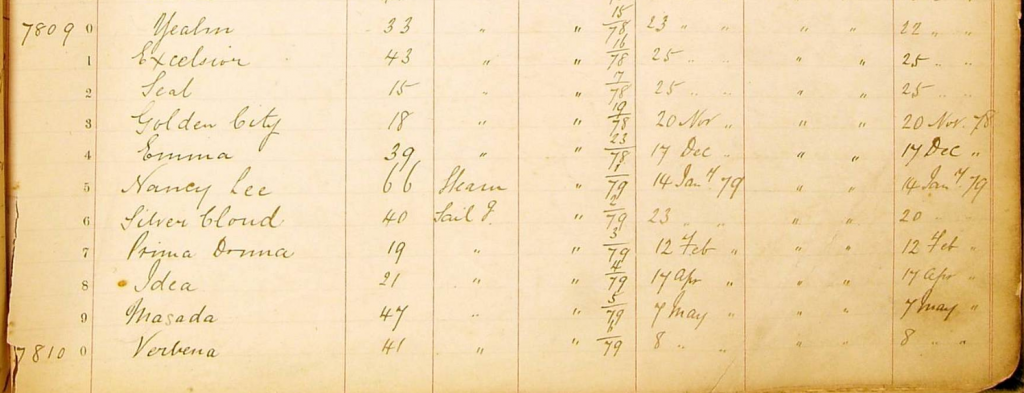
Listed consecutively, there is again no sign of any Plymouth vessel named Lubelia/Lobelia.
As a British vessel, her master completed Crew Agreements, listing her crew, and covering her voyages made during her existence as a British vessel – at least in outline, if not in detail. Fortunately, the two 6-month agreements for 1880 [List D], are held by Devon Archives and Local Studies; and have been partially transcribed, which confirm that her owner was Frederick W. Johns, of New Street, Plymouth, and that her crew during that year consisted of.
| Name | Born | Birthplace | Capacity | Previous vessel |
| Frederick W. Johns | 1840 | Plymouth | Master | Same vessel |
| John Ford | 1835 | Plymouth | Mate | Same vessel |
| Thomas Bratt | 1830 | Plymouth | Seaman | Same vessel |
| John Clampet | 1852 | Plymouth | Seaman | Same vessel |
| Charles Ford | 1864 | Plymouth | Seaman | Same vessel |
Unfortunately, these transcriptions were made with genealogists in mind, rather than maritime historians, and do not include any details of the fishing voyages made during that year – and time precludes examining the original agreements at present.
By Cornish standards, for a lugger of her size and type she was under-manned. Cornish luggers of her size were normally worked by at least six men, frequently by six men and a boy, or even seven men. But fleets of herring nets were slightly lighter work than mackerel nets, so a smaller crew must have been appropriate to the work, and this number of crew suggests that despite her size, she did not then partake of the western mackerel fishery.
On Census night 1881, fisherman Frederick Johns (41) was at home in 24, New St., Plymouth, with his wife Francis (47); when scores of his fellow fishermen and contemporary boats were down west, at Penzance, engaged in the mackerel fishery. He was again at home on Census night 1891, but was then resident in 21 Hoe Street, Plymouth, when, aged 51, he describes himself as Captain Merchant Navy – though this was an honorific, and he was never officially qualified as such.
Regrettably, I have been unable to tease out any contemporary reports of her fishing out of Plymouth, but in this era the winter herring fishery on the south coast of Devon was actively promoted. This must have given seasonal employment to the Prima Donna, and we know that she called at Brixham on at least one occasion.
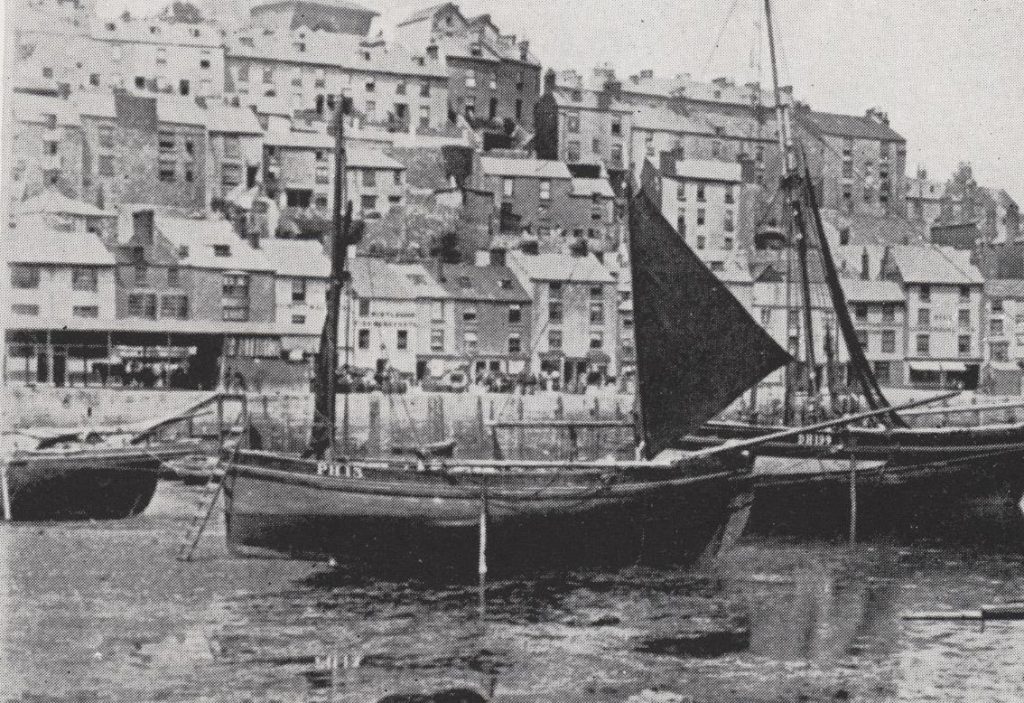
The Prima Donna remained on the Plymouth Register until August 15th, 1896, when, following her sale to Newlyn fishermen Charles Jenkin, James Jenkin, and Joseph Treneer, her registration as a ‘British Vessel,’ was cancelled, and she was transferred to the Port of Penzance, where she was added to the Registers of Sea-Fishing Boats, on August 19th, and given the distinctive Penzance fishing number – PZ.594.3
On becoming a Mount’s Bay lugger, brief reports about her appeared to the local press, from time to time. She was now principally employed as a Mount’s Bay mackerel-driver, but still worked seasonally as a herring-driver, out of Plymouth, under her skipper Charles Jenkin. This Plymouth herring season was essentially a winter fishery, when adverse weather, or other factors caused the expensive loss of nets – a potential loss against which the fishermen could not get insurance cover.
A LARGE NUMBER of herring-nets have been lost recently in the Plymouth fishery. Many of our boats are denuded of a considerable portion of their “fleets.”
LOSS OF NETS BY NEWLYN BOATS AT PLYMOUTH. – Last week the Cygnet and Prima Donna both lost 14 or 15 nets: carries away by the weight of the unusual quantity of fish.
Cornishman, Thursday, December 31st, 1896
Running from about November to February, the Plymouth herring season occurred at a time of year when the passage to and from her new home port, was not always plain sailing.
The Prima Donna fishing-boat, had a nasty time on her voyage home from Plymouth to Newlyn on Saturday. Round the Lizard there was an awful sea.
Cornishman, Thursday, February 11th, 1897,
A little over twelve months after she was acquired by the Jenkin brothers & Treneer, in October 1897, she had a new steam boiler and ‘engine’ installed, but this engine was not for propelling the boat. This engine was a steam capstan for hauling the heavy ‘footline,’ and the lengthy train of mackerel nets attached.
The Prima Donna also occasionally worked in the North Sea herring fishery, in August to September, or October, or alternatively on the coast of Ireland, either for mackerel off Kinsale, or herring out of Howth, which several seasons tended to follow the close of the home mackerel season in about June.
The voyage to the North Sea represented a significant financial risk, with the hopes of good catches, and high prices – which hopes were all too often dashed. Away from home for a month or six weeks, all hands lived on board their luggers for the duration of the season, cooking their food on the small cabin stoves, eating and sleeping in the small cabins, below decks aft. These cabins were fitted with a run of bunks on either side, following the exterior line of the hull; bench seating below and inboard of the bunks, with a central table between. Space was very restricted. Working as share-fishermen, they received no wages as such, but shared in any profits made from the sale of their catch, after deducting the expenses of the voyage.
During the first decade of the nineteen hundreds, reports about local fishing boats became more frequent, as the general public became more aware of the precarious nature of that employment. By these we know that the Prima Donna made several trips to the North Sea, and it was during one of these that she was photographed at Whitby.
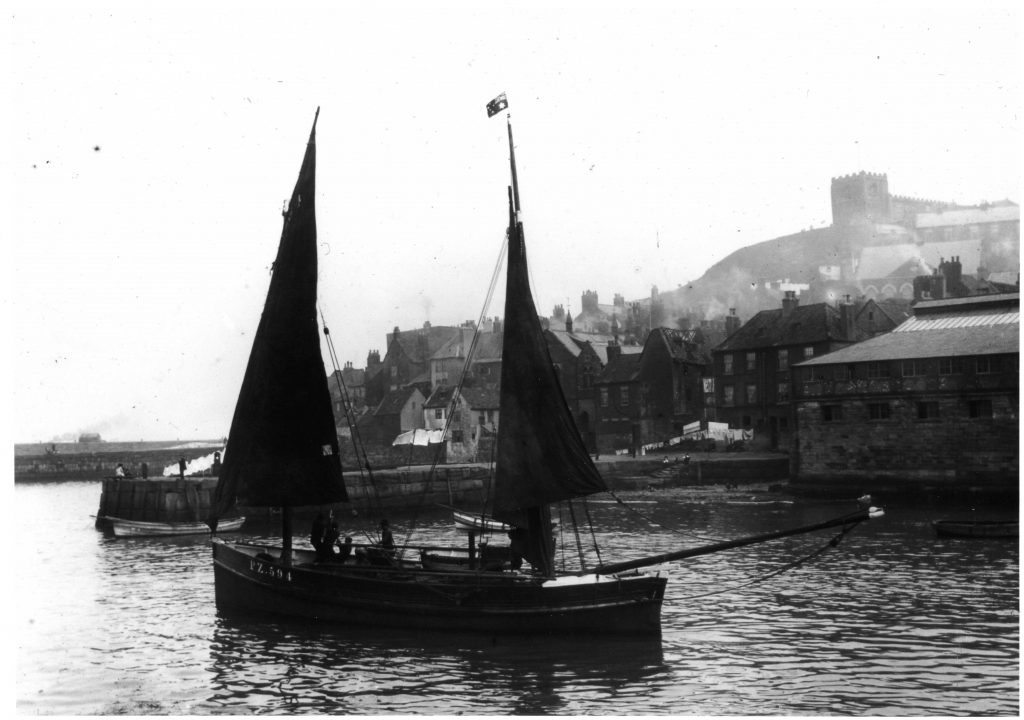
And coming in again past the Newlyn Eastern lighthouse.
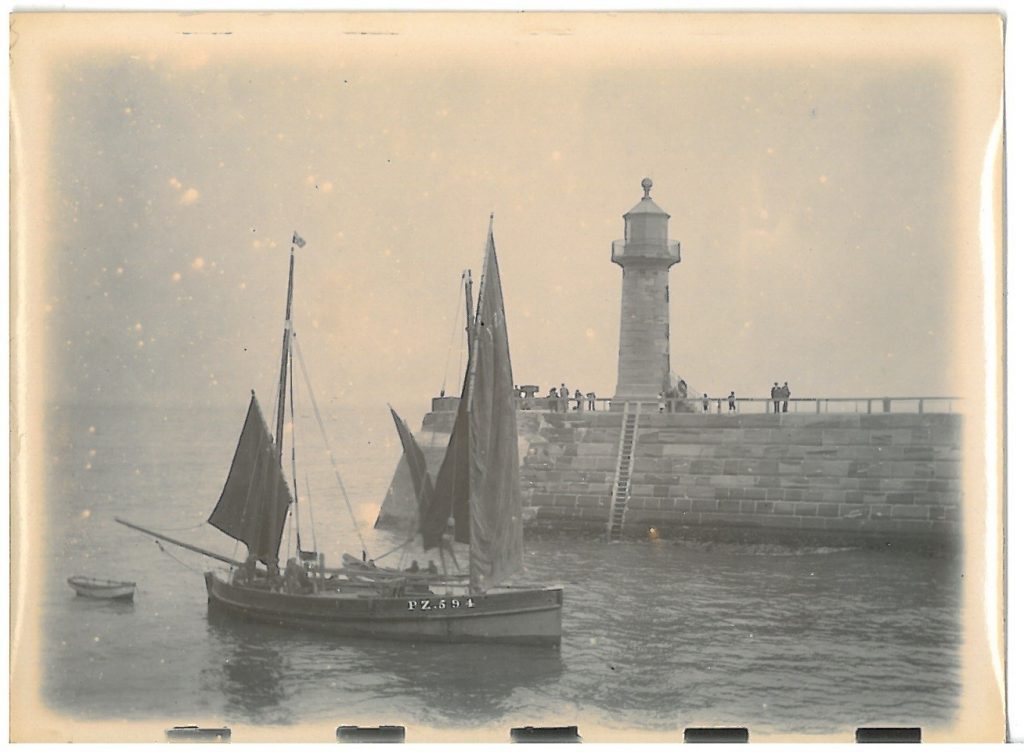
Prima-Donna was one of the boats known as a Sunday keeper, and appears in both the above to be flying the ‘Star’ burgee of the Bethel-Union, from her mizen topmast, to emphasise the point.
1903.
The Empress, Prima Donna, Annie Harvey, and Martha Jane, left on Tuesday for Whitby and Scarboro’, to engage in the herring fishery. Others will be leaving in the course of the week.
Cornishman, Thursday, July 23rd, 1903.
We are more than pleased to be able to record that a fair measure of success has attended the efforts of our fishermen who have engaged in the herring fishery in the North Sea. During the past fortnight some of them have made from £40 to £70 for each week’s work. Among those who have done well we hear the names of the Prima Donna, Little Clara, and Annie Harvey. The boats are fishing out of Whitby and Scarborough. The revival of the fishery is a matter for much satisfaction. For many years it has been a failure, and Cornish fishermen have only visited it in dozens, whereas 30 years ago they were to be found in the North Sea by hundreds.
Cornishman, Thursday, September 3rd, 1903
But, by the end of September she was back in home waters again, amongst a number of the larger luggers hauling boat-loads of pilchards from the seines down near the Lizard.
NEWLYN.
HEVA. – On Friday “heva” was sounded through the town, seines being shot at Gunwalloe in the morning and Mullion in the evening. On receipt of Friday morning’s news a half-dozen boats left immediately for Gunwalloe with the expectation of loads of pilchards, of which each boat received one-seventh for bringing them here. Three Porthleven boats and the Boy Willie and Mizpah arrived here in the evening with a load each, and selling as late as 10 p.m. realised from 5s 7d to 6s per basket. Several other boats left during the evening for Mullion, but three returned owing to the dense fog enveloping the Bay. Through the night and on Saturday morning there arrived here from the Mullion and Gunwalloe seines the El Dorado, Prime Donna, Alice, Mary and Emily, and Our Boys with full “loads,” and the Auld Lang Syne and Martha Jane with only part “loads” each. Seine pilchards, unlike the drift fish, are put up by auction, and Saturday morning’s fish fetched from 5s 8d to 6s 2d per ‘basket’ of from 300 to 400. Each curer had a quantity of seine fish, and all through Friday night continuously till Saturday morning 9 a.m., work proceeded at the smartest rate to get these thousands of hogsheads of pilchards out of the boats, carted to the cellars, and stowed away in the capacious tanks to pickle.
Cornishman, Thursday, October 1st, 1903.
1904.
NEWLYN.
THE Prima Donna has returned from her rather short voyage to Howth having earned little beyond her expenses. The herring there cannot be caught by the usual herring nets, their habits having apparently changed, as they swim much nearer the surface than herring [are] invariably found, and can only be taken by spring mackerel nets. Almost the only herring the Prima Donna obtained were caught in the half “springers” she had with her herring nets. Other boats from Mousehole and St. Ives are similarly situated, and the few with trains of spring mackerel nets on board are meeting with much success, as the herring caught off Howth are superior to any summer herring on the British coast, realising from 30s. to 35s. per “meas” of 500.
Cornishman, Thursday, August 18th, 1904
NEWLYN.
News having come to hand of a few hundreds of mackerel having been landed by the boats at Kinsale on Tuesday morning, the Expert left for that port the same afternoon. The Children’s Friend, Morning Star, and Prima Donna, sailed the following day for the Irish port.
Cornishman, Thursday, September 15th, 1904.
1905.
In Newlyn, at the height of the mackerel season, quay space was at a premium, with fish-laden luggers nudging and jostling between each other in an attempt to get at least their bows close enough to the pier to land their catch.
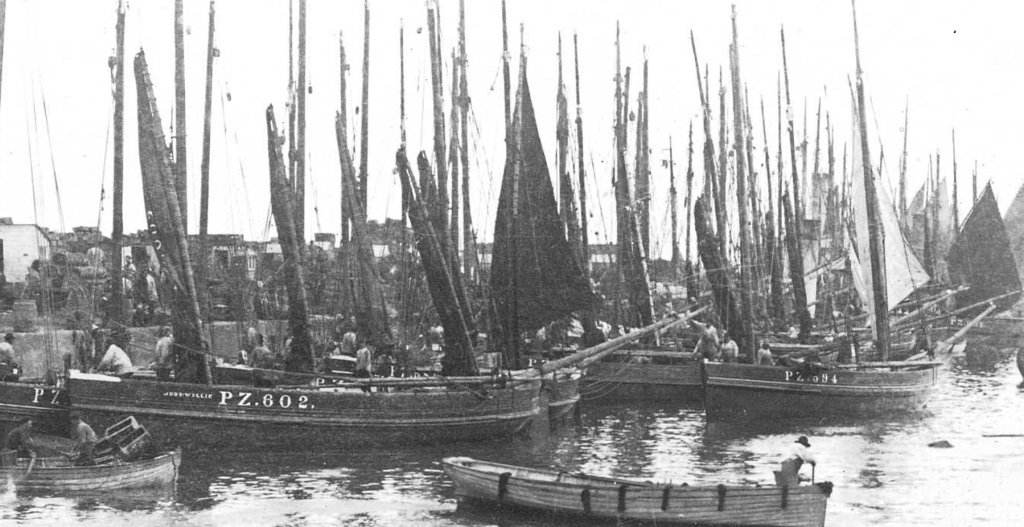
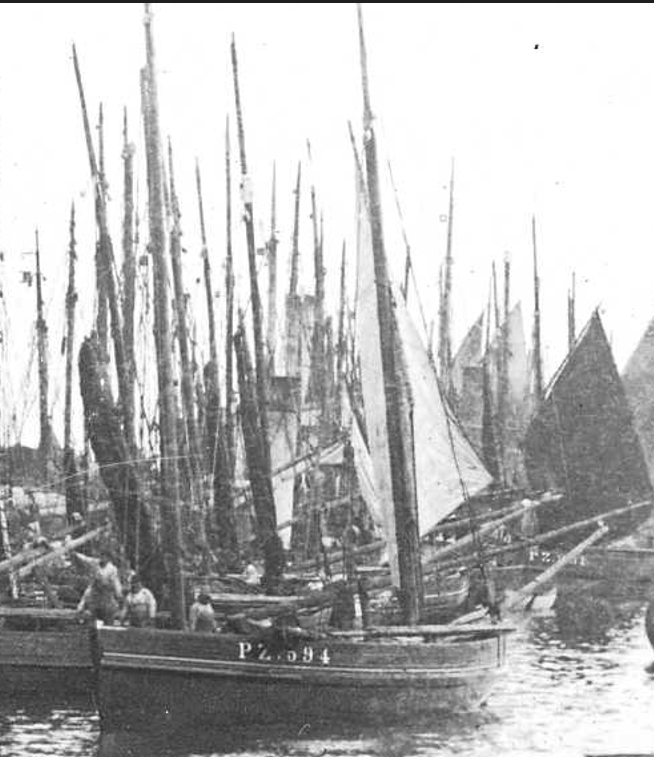
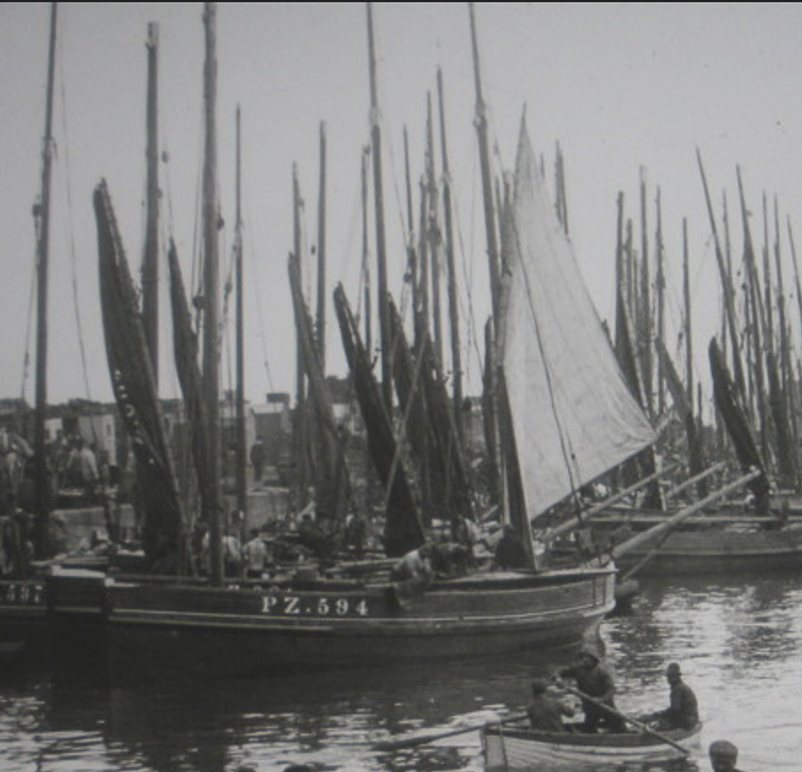
(Author’s collection)
The lugger General Gordon, Capt. T. Harvey, left Mousehole on Tuesday last for Howth, Ireland, from where they will prosecute the herring fishery. She was accompanied by two luggers from Mousehole, which is sending another three to the Irish fishery. Only one other Newlyn boat, the Prima Donna, Messrs. Jenkin Bros., will fish out of Howth this season.
The mackerel season has now finally closed. A few boats continued to work their mackerel nets last week, but with small success. There were a few hundred mackerel down the first three nights, prices if the boats were in early, ranging from 7s. to 12s. per 120. But the fish were falling off, and each day the boats were dropping out and belaying till on Friday only the Breadwinner and Boy Willie were left mackerel driving and the following day these two gave up and hauled their nets out. The season has been by far the longest on record, and extended from the latter part of December last to the second week of July. But in spite of this fact and of the mackerel being laned in much larger quantities than ever before the season has been largely a failure, gluts and bottom prices being the prevailing state of things during more than half of the season. Except in the case of a small number of boats that did well early in the spring fishery, the mackerel season just closed has been the worst of recent years. What had for long years been by far the best payable season, in Mount’s Bay fishermen’s harvest, has now become one of the worst, and many luggers’ crews earned little beyond their food for weeks in succession, while a large number of boats have not shared as much as £2 per man in any single week for the season. As regards the East Coast fleet a good number did well on the Western voyage, but with many of them it was little other than a failure, some of them failing to earn the expenses connected with the trip.
Cornishman, Thursday, July 20th, 1905
NEWLYN NOTES AND NEWS. – On Thursday the lugger Prima Donna returned from Howth, where she had been engaged on the herring fishery for the past six weeks. The General Gordon returned from the same place on Friday night to Mousehole from where her crew mainly hailed. These with the half dozen Mousehole boats made but a very indifferent season at Howth. The earnings, after putting aside the expenses of the trip were small.
Cornishman, Thursday, August 24th, 1905
On their return to Newlyn her crew then changed over their fleet of nets, and returned to Irish waters to fish for mackerel.
NEWLYN NOTES AND NEWS. – There arrived from Kinsale on Wednesday afternoon the luggers Prima Donna and Martha Jane, while on Thursday the Honor, Expert, Paragon, Thomasine, and Coronation returned, followed by the Defiance and Comfort (Mousehole). The mackerel season on the Irish coast has been but a poor one to most of the boats, and this week fishing there was generally slack.
Cornishman, Thursday, November 16th, 1905
1906.
Another persistent problem in this era, was the running down and cutting away, of fleets of drift nets, by steam trawlers, towing their trawl gear across the fleets – regardless. While a main report that spring focused on the loss of nets of the lugger William, by a French steam trawler, it also mentioned the Prima Donna. –
It is only a fortnight since the Prima Donna was similarly treated by an Ostend trawler, although in her case the number of the craft concerned was obtained, and the Prima Donna’s nets recovered the next morning.
Cornishman, Thursday, May 10th, 1906.
At Scarborough last week the herring were of mixed quality, and though plentiful almost every night, were on one occasion met with in huge quantities. It took the crew of the Prima Donna from midnight till 3 p.m. the following afternoon to boat no more than five nets, most of the train having gone to ground with the great weight of fish. Help was obtained of a Lowestoft boat, who succeeded in raising the remainder of the herring filled nets, and in accordance with custom received the fish the nearly lost nets so abundantly netted.
Cornishman, Thursday, September 13th, 1906
It is tempting to imagine that it was after this great catch of herring, when the men were trying to clear their nets and land their catch, that the opening postcard-photo of the Prima Donna was taken at Scarborough.
1907.
Passed with no reports, but that summer she was laid-up at Newlyn for a while, between seasons.
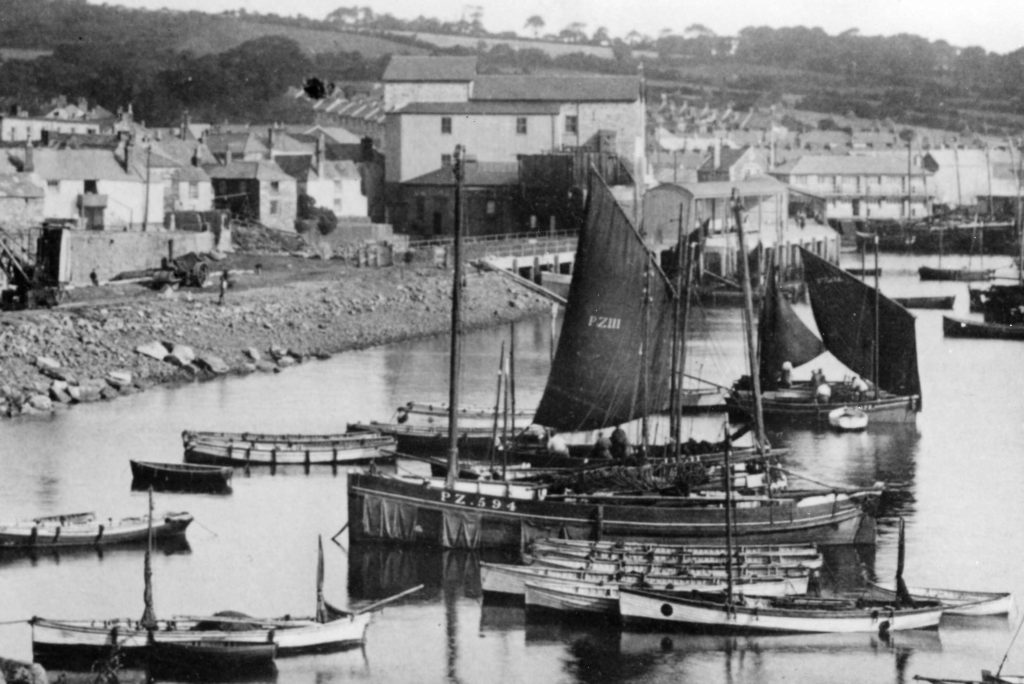
Building the new road across the head of the harbour is in progress in the above picture, which dates the picture to the summer of 1907. Note the hessian sacks hanging over the bow planking, which were kept wet each afternoon, to prevent the dark hull overheating in the sun, opening the seams and warping the plank strakes.
1908.
At Plymouth last week some of the Mount’s Bay luggers landed some splendid shots of herring. Of the three Newlyn boats one obtained three last (30,000) and another 5,000, while the other craft met with a blank. The herring realised from 5s. to 6s. per 126. There are numerous dog-fish on the ground and much damage to the nets has resulted. On Friday night in the wild weather there were losses of from one to five nets apiece by a number of the boats in Plymouth waters. The Prima Donna returned to Newlyn from Plymouth on Sunday night, three of the crew having sustained family bereavements.
Cornishman. Thursday, January 9th, 1808
They went back to fish in Plymouth waters a few days later, but only for a short period.
After fishing out of Plymouth for three weeks, with herring nets, the Prima Donna, came home last Monday morning, and the Lizzie and Annie Harvey on Thursday. One of the luggers obtained an excellent shot and a good price for the fish a fortnight ago, but apart from this single instance, results were slack generally. Nothing but dog-fish on the usual grounds, and the season there was brought to a close.
Cornishman. Thursday, January 16th, 1808.
1910.
The fishing lugger Prima Donna is about to be broken up, and for this purpose has been brought on the slip leading from the harbour to the new road.
Cornishman, Thursday, August 11th, 1910
And that brief note, marked the beginning of her end. Her Penzance fishing register simply being endorsed – Cancelled 9/11/10. Broken up.
Registered dimensions:
| Plymouth 12/02/1876 | Penzance 19/08/1896 | Penzance 09/06/1906 | |
| Length of Keel (ft) | 46.50 | 47.00 | 47.00 |
| Length (ft) | 50.80 | 50.80 | 50.80 |
| Breadth (ft) | 14.30 | 14.30 | 14.30 |
| Depth (ft) | 6.6 | 6.6 | 6.6 |
| Tonnage – Tons gross | 18.54 | 18.54 | 29.00 |
| Tonnage – Tons net reg | 18.54 | 18.54 | 29.00 |
| Crew – Men | (5) | 6 | 6 |
| Crew – Boys | – | 1 | – |
Tony Pawlyn
24 February 2023
- PLYMOUTH’S OTHER FLEET-THE MERCHANT SHIPPING & FISHING BOAT REGISTERS OF THE PORT OF PLYMOUTH, Gareth Ernest Hicks, 2007. ISBN 0-9552265-1-1.
- Kresen Kernow [KK]; MSR/PENZ/5; folio 199. Jonadab ~ 299.PZ.; & MSR/PENZ/5; folio 199. Unexpected ~ 288.PZ., both registered on October 24th, 1878.
- Kresen Kernow; MSR/PENZ/8; folio 20.1.
